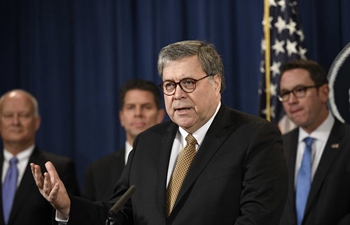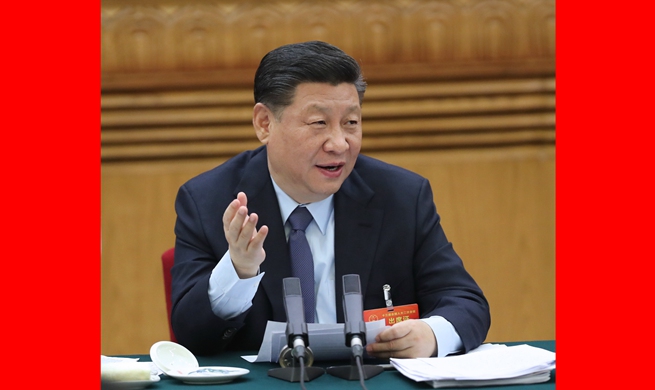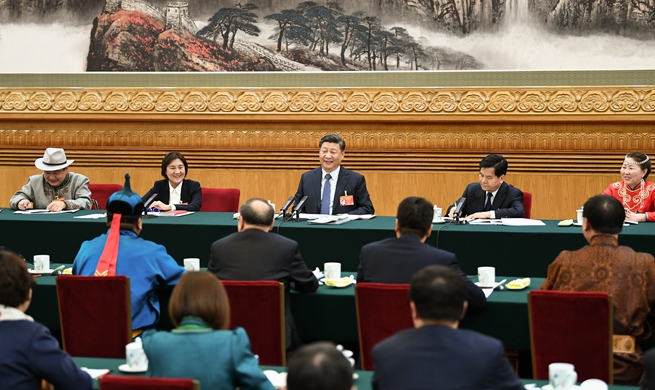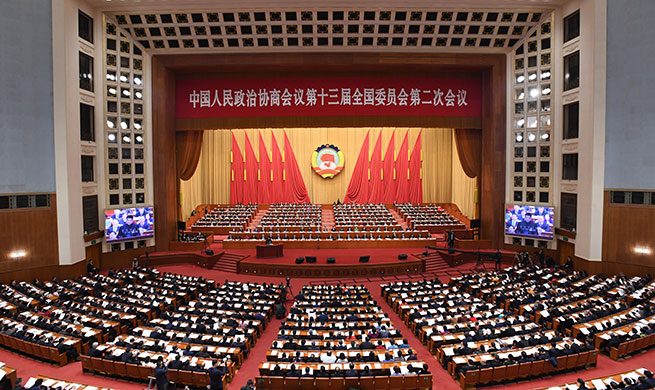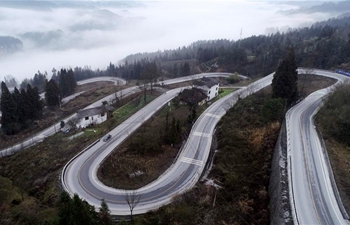ISTANBUL, March 9 (Xinhua) -- Turkish Interior Minister Suleyman Soylu said that Turkey and Iran were planning to conduct a joint operation against the Kurdistan Workers' Party (PKK), but analysts feel a limited strike is more likely as they have doubts about Tehran's willingness to inflict a blow to the outlawed group.
Tehran would not crack down on it if the PKK sends out the message about it not being part of a U.S.-led war on Iran, Nihat Ali Ozcan, a security policy analyst, told Xinhua.
The PKK has been waging a bloody war against Turkey since 1984 to carve out an autonomous, if not independent, Kurdistan in the country's predominantly Kurdish southeast.
Turkey and Iran have occasionally cooperated against the PKK in the past, but Tehran was sometimes targeted as well by Turkish media for offering protection to the group.
After withdrawing from the 2015 nuclear deal with Tehran last year, the United States has been trying to scramble a coalition of Arab countries and Israel against Iran, which U.S. President Donald Trump called a "terrorist state."
It is widely argued that Washington may wish to use the PKK's Iranian extension, the Party for Free Life of Kurdistan (PJAK), to destabilize the Islamic Republic for a change of regime.
"We will, God willing, carry out with Iran a joint operation against the PKK," Turkey's Soylu said on Wednesday, noting it was what Ankara had long sought to do.
Ozcan, who teaches at TOBB University of Economics and Technology in Ankara, does not rule out a potential operation that may be politically motivated.
"It's customary to hear such remarks ahead of elections (in Turkey). You see some action and that's it," he said.
Turkey will have important local elections at the end of March, in which the ruling party may lose most big cities to the opposition, according to some polls.
It is often argued that Turkey's ruling Justice and Development Party may order a cross-border operation against the PKK with a view to winning over nationalist voters as it did ahead of the general elections last year.
"If Tehran feels the PJAK will pose a threat to it, then it would move against the PKK," said Murat Bilhan, the vice chairman of the Istanbul-based Turkish Asian Center for Strategic Studies.
Referring to the fact that Iran is looking for allies to break Washington's choking sanctions and pressure, Bilhan, a former diplomat, said that "a joint operation on the PKK is therefore not to be ruled out."
"Iran used the PKK against Turkey in the past when it posed no threat to itself, but now it's in Tehran's interest to cooperate with Turkey," he stated.
The PKK has its main headquarters on Iraq's Qandil Mountains and several bases in northern Iraq.
A fairly large part of the Qandil mountain range is on Iranian territory, making it necessary for Ankara to obtain Tehran's cooperation for a fully successful operation.
When Turkish jets struck the PKK headquarters in the past, local media usually reported that leading PKK figures sought refuge in Iran.
Ozcan, who has a book on the PKK to his credit, feels that Iran would, before making a decision, want to see what shape the U.S.-PKK relations would take in the days ahead and weigh the pros and cons of turning the PKK into a hostile force for itself in Iraq and Syria.
Since the early 1990s when Turkey's battle against the PKK particularly intensified, reports have occasionally appeared in local media that the U.S. backs the PKK as part of its plan for the creation of a Kurdish state in the region.
Ankara also sees the U.S.-backed Kurdish militia in Syria, the People's Protection Units (YPG), as the Syrian offshoot of the PKK.
A staunch supporter of Damascus in the Syrian war, Iran has so far been careful of not alienating the Kurdish militia in Syria, which has carved out three self-declared autonomous cantons along and near the Turkish border thanks to Washington's military support.
Even if a joint operation on the PKK is carried out, Ozcan does not think it would mean much as far as bilateral ties between Ankara and Tehran are concerned.
Maintaining that Iran's ties with the PKK go back as far as 1982, he said cooperation against the PKK between the two neighbors in the past decades has been more superficial than genuine.
Despite an appearance of cooperation against the PKK over the years, there has never been consensus below the tip of the iceberg between the two neighbors, he remarked.
"A long-term and synchronized cooperation is needed between the two countries to inflict a lethal blow to the PKK," he added.
Turkey relaunched a massive campaign against the PKK following the breakdown in 2015 of a peace process to settle the Kurdish issue.
According to Bilhan, Soylu's announcement of the intended joint operation is a message to both the U.S. and Russia.
Noting Moscow does not recognize the PKK as a terror group, he said that "Russia has a hostile attitude neither to the PKK nor the YPG."
Ankara has long criticized Washington for its military support to the YPG, saying the U.S. has provided the Kurdish militia with 23,000 truckloads of weapons, munitions and armored vehicles during the Syrian war.
Turkish Defense Minister Hulusi Akar said on Friday that the PKK has currently a total of around 17,000 members, with 750 of them estimated to be within Turkish borders.
About 3,000 PKK members are in Iraq, while the remaining 13,000 are in Syria, said Akar.
Turkey's Ulusal TV reported the same day that cooperation between Turkey and Iran will begin with intelligence sharing, while a joint operation is expected only in the medium or long term.
"Iran thinks the Iraqi and Syrian governments should also be involved in the operational process (against the PKK)," the TV channel said.
Ankara refuses to have dialogue with the Syrian government, arguing it has lost legitimacy to rule.









